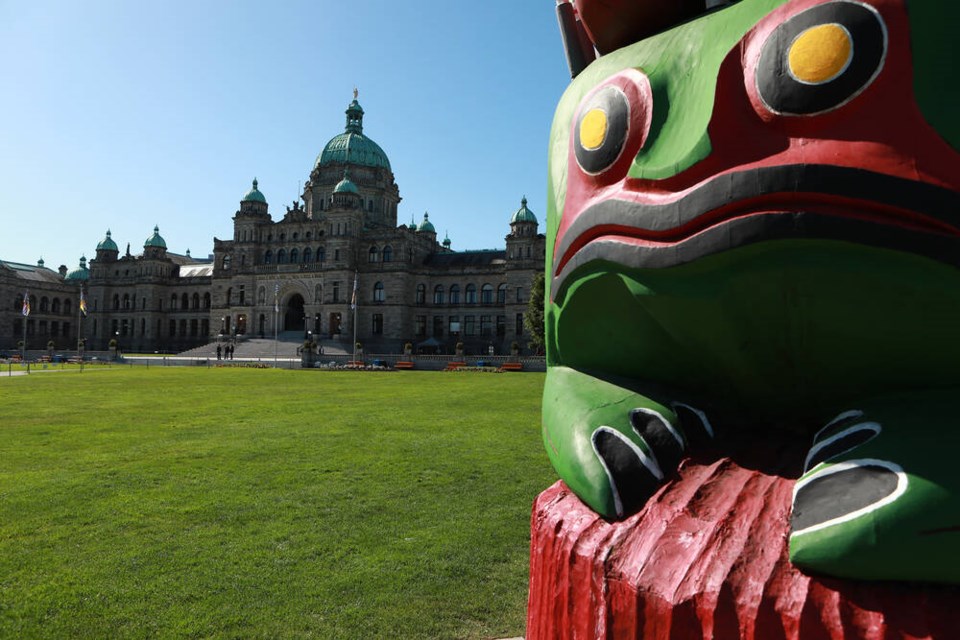B.C. will be appealing a landmark case that returned title rights to a former summer fishing village of five Island First Nations, says Attorney General Niki Sharma.
Following a lengthy trial, an Aug. 7 decision in B.C. Supreme Court handed Cowichan Tribes and other First Nations title over a chunk of federal and city land in Richmond that for centuries was used as a summer fishing village by Cowichan Tribes and other Island First Nations before eviction by colonial administrators.
Premier David Eby said, after the decision last week, that B.C. will look for an out-of-court resolution through negotiations with all the involved nations, including Musqueam First Nation, a defendant in the case which has come out strongly against the decision.
Sharma announced Monday that B.C disagrees strongly with the decision and will seek a stay in title right implementation until the appeal is resolved.
Sharma said in a statement the ruling could have “significant unintended consequences” for private property rights that have to be considered by a higher court.
The ruling by B.C. Supreme Court Justice Barbara Young is an example of why B.C. prefers to negotiate land claims instead of going to court, which could cause “considerable uncertainty,” she said.
“Our government is committed to protecting and upholding private property rights, while advancing the critical work of reconciliation,” she said. “We will continue to provide updates as this process moves forward.”
B.C.’s decision came hours after Island First Nations, in their own press conference, celebrated the ruling.
Chief John Elliott of Stz’uminus was steadied by those around him as he became emotional at times during his speech on what the ruling meant to his people. “Someday we’ll be back on the river doing what our ancestors did.”
After 513 trial days, the judge found that Cowichan Tribes, the Stz’uminus First Nation, Penelakut Tribe, Halalt First Nation — as well as the Lyackson First Nation in a supporting role — had Aboriginal title over the Tribes’ historic Tl’uqtinus village on the southeast side of Lulu Island.
Cowichan Tribes Chief Sulsulxumaat Cindy Daniels said the declaration is a “powerful reminder” to Canada and B.C. that historical injustices must be addressed.
In the past, her nation had tried to get the matter solved through the treaty process, but didn’t get anywhere, she said. “So we pursued truth and reconciliation through the courts.”
Daniels said the case was not pursued with ill will or malice, but was instead done to honour Cowichan history and culture.
David Robbins, lead counsel with Woodward & Company LLP, who represented the plaintiffs in the case, said the nations’ case had always been focused on land and fishing rights and they are uninterested in receiving money for lands that had been taken, he said. “This case has always been about land recovery.”
The exact size of the Quw’utsun title has yet to be determined, but includes private fee simple land, which was held at times by the federal government, the City of Richmond, as well as lands that were sold to settlers.
Some of the lands are now being used as commercial warehouses.
In the ruling, Justice Young had suspended her decision for 18 months “to allow for an orderly transition of the lands.”
Elliott, of Stz’uminus, said they’re always willing to negotiate outside of the court process.
Steve Kooner, the B.C. Conservative critic for attorney general, said the province should have come up with a solution earlier before the six-year case came to an end.
“There’s been a significant amount of B.C. taxpayer money spent on this particular case,” he said, adding that the court time used on the case could have been used to deal with repeat violent offenders.
Kooner said the ruling raises questions of how sales, mortgages and insurance would work for owners of fee simple lands that could now have Aboriginal title above private property rights.
When asked for comment, the federal minister of justice and attorney general of Canada referred the matter to Transport Canada.
Transport Canada spokesperson Simon Rivet said his department is still reviewing the decision and will continue to work with all parties.
— With a file from Stefan Labbé, Business in Vancouver



